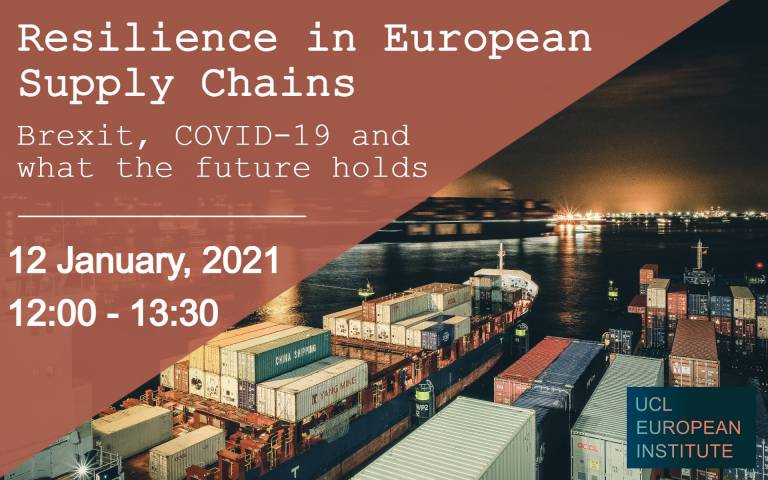Event blog: Supply Chains Roundtable
27 January 2021
A recap of our 12 January virtual roundtable on “Resilience in European Supply Chains: Brexit, Covid-19 and what the future holds.”

On 12 January, the UCL European Institute hosted two dozen participants in a virtual roundtable on “Resilience in European Supply Chains: Brexit, Covid-19 and what the future holds.” Speakers and attendees from government, industry, academia and think tanks engaged in a lively, in-depth conversation about the future of supply chains in light of these recent global issues.
Bloomberg News’ Joe Mayes moderated the event, which featured presentations from Janet Godsell, Professor of Operations and Supply Chain Strategy, University of Warwick; Dr Jing Meng, Lecturer in Economics & Finance of the Built Environment, UCL Bartlett; and Nikhil Vadgama, Deputy Executive Director, UCL Centre for Blockchain Technologies.
Acknowledging that Covid-19 is the most significant global shock impacting life-critical products such as food and healthcare, one speaker noted that firms have exhibited a high degree of adaptability during Covid-19. This speaker urged the importance of having “economies of scope, not scale” and countries’ self-sufficiency in the manufacture of life-critical products.
Another presentation examined where the UK and other secondary regional supply chains fit in the global picture, including a look at modelling being used to predict scenarios of trade pattern in reaction to the amount of lockdown needed to combat Covid-19.
The event included a discussion of the impact of emerging technologies such as blockchain on supply chains, as well as a look at how sectors have utilized these technologies in recent months. One suggestion was that Covid-19 has been a missed opportunity for many firms to engage emerging technologies in the management of the vaccine supply chain and cold chain, and to produce a system of immunity certificates and passports. Meanwhile, there appeared to be very little, if any, reported deployment of blockchain solutions to Covid-impacted supply chains.
The roundtable discussion largely focused on Brexit, with industry-focused participants raising concerns about the operational issues that have emerged since the passage of the EU Future Relationship Act.
Participants agreed that ongoing issues are largely part of a “teething” period that will soon be overcome, but that individual businesses will ultimately need to make judgements about their operating models in response to systemic changes. A key point was that, as a result of Brexit, many UK companies will be exporting products to Europe for the first time and may need more support in understanding what it means to export internationally. This, it was suggested, could be an advantage for the UK in the longer term.
However, it was noted that many longer-term issues will not be evident to the public in the form of long queues of lorries, but rather will affect the effort and cost behind-the-scenes. Businesses will have to build in much more time at back end to put the necessary paperwork and processes in place for “frictionless” trade across the Channel.
With regards to lessons learned from Covid-19, one industry attendee noted that the pandemic has revealed “how interconnected we are” in supply chain resilience issues, noting that one UK company’s challenges may be shared by counterparts in Europe, Australia, and other parts of the world. As a result, participants called on the UK government to ensure that they plan supply chain resilience into new, post-Brexit trade relationships.
The UCL European Institute would like to extend our thanks to presenters and participants for this engaging conversation.
 Close
Close

